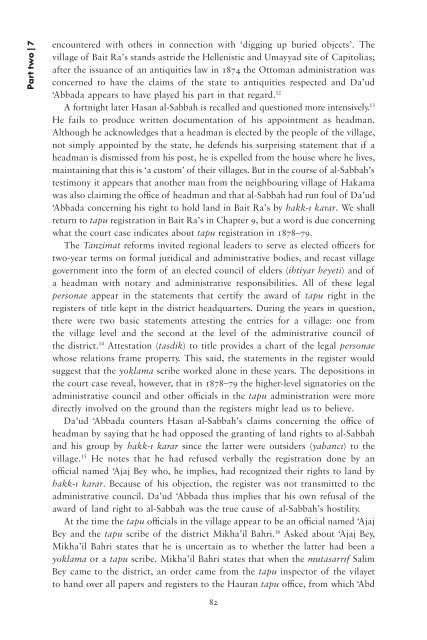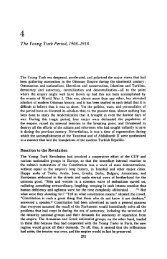Governing property, making the modern state - PSI424
Governing property, making the modern state - PSI424
Governing property, making the modern state - PSI424
Create successful ePaper yourself
Turn your PDF publications into a flip-book with our unique Google optimized e-Paper software.
Part two | 7<br />
encountered with o<strong>the</strong>rs in connection with ‘digging up buried objects’. The<br />
village of Bait Ra’s stands astride <strong>the</strong> Hellenistic and Umayyad site of Capitolias;<br />
after <strong>the</strong> issuance of an antiquities law in 1874 <strong>the</strong> Ottoman administration was<br />
concerned to have <strong>the</strong> claims of <strong>the</strong> <strong>state</strong> to antiquities respected and Da’ud<br />
‘Abbada appears to have played his part in that regard. 12<br />
A fortnight later Hasan al-Sabbah is recalled and questioned more intensively. 13<br />
He fails to produce written documentation of his appointment as headman.<br />
Although he acknowledges that a headman is elected by <strong>the</strong> people of <strong>the</strong> village,<br />
not simply appointed by <strong>the</strong> <strong>state</strong>, he defends his surprising <strong>state</strong>ment that if a<br />
headman is dismissed from his post, he is expelled from <strong>the</strong> house where he lives,<br />
maintaining that this is ‘a custom’ of <strong>the</strong>ir villages. But in <strong>the</strong> course of al-Sabbah’s<br />
testimony it appears that ano<strong>the</strong>r man from <strong>the</strong> neighbouring village of Hakama<br />
was also claiming <strong>the</strong> office of headman and that al-Sabbah had run foul of Da’ud<br />
‘Abbada concerning his right to hold land in Bait Ra’s by hakk-ı karar. We shall<br />
return to tapu registration in Bait Ra’s in Chapter 9, but a word is due concerning<br />
what <strong>the</strong> court case indicates about tapu registration in 1878–79.<br />
The Tanzimat reforms invited regional leaders to serve as elected officers for<br />
two-year terms on formal juridical and administrative bodies, and recast village<br />
government into <strong>the</strong> form of an elected council of elders (ihtiyar heyeti) and of<br />
a headman with notary and administrative responsibilities. All of <strong>the</strong>se legal<br />
personae appear in <strong>the</strong> <strong>state</strong>ments that certify <strong>the</strong> award of tapu right in <strong>the</strong><br />
registers of title kept in <strong>the</strong> district headquarters. During <strong>the</strong> years in question,<br />
<strong>the</strong>re were two basic <strong>state</strong>ments attesting <strong>the</strong> entries for a village: one from<br />
<strong>the</strong> village level and <strong>the</strong> second at <strong>the</strong> level of <strong>the</strong> administrative council of<br />
<strong>the</strong> district. 14 Attestation (tasdik) to title provides a chart of <strong>the</strong> legal personae<br />
whose relations frame <strong>property</strong>. This said, <strong>the</strong> <strong>state</strong>ments in <strong>the</strong> register would<br />
suggest that <strong>the</strong> yoklama scribe worked alone in <strong>the</strong>se years. The depositions in<br />
<strong>the</strong> court case reveal, however, that in 1878–79 <strong>the</strong> higher-level signatories on <strong>the</strong><br />
administrative council and o<strong>the</strong>r officials in <strong>the</strong> tapu administration were more<br />
directly involved on <strong>the</strong> ground than <strong>the</strong> registers might lead us to believe.<br />
Da’ud ‘Abbada counters Hasan al-Sabbah’s claims concerning <strong>the</strong> office of<br />
headman by saying that he had opposed <strong>the</strong> granting of land rights to al-Sabbah<br />
and his group by hakk-ı karar since <strong>the</strong> latter were outsiders (yabancı) to <strong>the</strong><br />
village. 15 He notes that he had refused verbally <strong>the</strong> registration done by an<br />
official named ‘Ajaj Bey who, he implies, had recognized <strong>the</strong>ir rights to land by<br />
hakk-ı karar. Because of his objection, <strong>the</strong> register was not transmitted to <strong>the</strong><br />
administrative council. Da’ud ‘Abbada thus implies that his own refusal of <strong>the</strong><br />
award of land right to al-Sabbah was <strong>the</strong> true cause of al-Sabbah’s hostility.<br />
At <strong>the</strong> time <strong>the</strong> tapu officials in <strong>the</strong> village appear to be an official named ‘Ajaj<br />
Bey and <strong>the</strong> tapu scribe of <strong>the</strong> district Mikha’il Bahri. 16 Asked about ‘Ajaj Bey,<br />
Mikha’il Bahri <strong>state</strong>s that he is uncertain as to whe<strong>the</strong>r <strong>the</strong> latter had been a<br />
yoklama or a tapu scribe. Mikha’il Bahri <strong>state</strong>s that when <strong>the</strong> mutasarrıf Salim<br />
Bey came to <strong>the</strong> district, an order came from <strong>the</strong> tapu inspector of <strong>the</strong> vilayet<br />
to hand over all papers and registers to <strong>the</strong> Hauran tapu office, from which ‘Abd<br />
82












